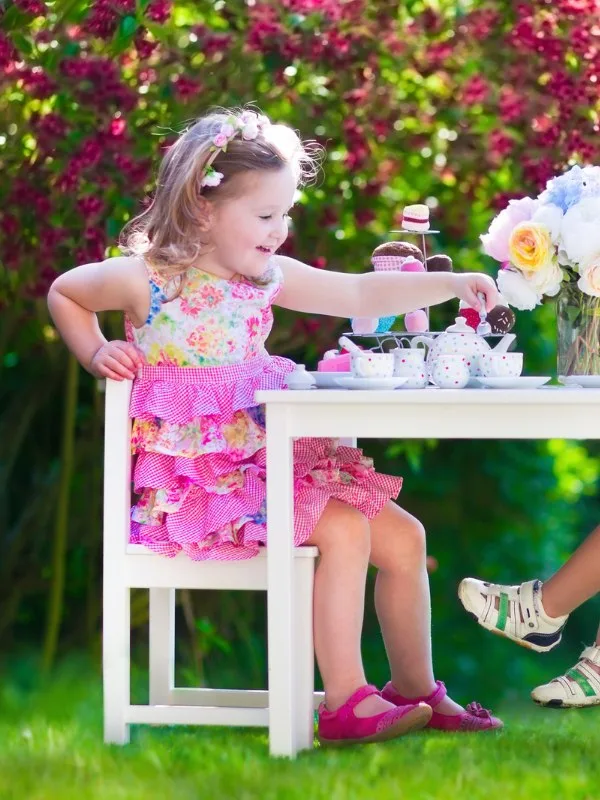Ready to dive into the never-ending world of make-believe? Besides transforming your living room into a magical kingdom or a bustling space station, pretend play offers lifelong benefits that your child can cherish and use all the way into adulthood.
There’s more to pretend play than meets the eye! Let’s explore the long-lasting benefits of pretend play together!

This post may contain affiliate links. As an Amazon Associate and a participant in other affiliate programs, I earn a commission on qualifying purchases. Read our disclosure policy.
Pretend Play For Kids
Between the ages of 3 to 9, kids are non-stop fun factories! They’re full of energy, always on the move, and always looking for the next big adventure.
During this time, they’re also little brainiacs in the making. Their brains are growing at an astonishing rate, leading to imaginations that are out of this world!
But they’re not just playing. Kids are mastering skills like talking, moving, making friends, and managing their emotions. Every day is a brand new expedition waiting to be discovered.
In this land of make-believe, they’re concocting stories, grappling with tricky problems, understanding how others feel, and coming to understand their own emotions.
It’s the ultimate training ground for creativity, where friendships blossom and the seeds of confident, empathetic, and resourceful adults begin to sprout.
Pretend Play Benefits
One of the main benefits of pretend play is its tremendous impact on your child’s cognitive development.
Pretend play and cognitive growth go hand in hand, forming a dynamic duo that nurtures your child’s blossoming intellect.
Through imaginative play, your child actively stretches cognitive muscles, like problem-solving, creativity, memory, language, and abstract thinking.
As they dive into make-believe scenarios, they bump into challenges that call for creative solutions, weave intricate narratives, invent new words, and navigate complex social dynamics.
These mental workouts enhance their problem-solving skills, supercharge their creativity, and fine-tune their language and communication abilities.

Pretend Play And Social-Emotional Growth
Another perk of pretend play is its influence on your child’s social and emotional growth.
Through imaginative play, your child cultivates empathy by stepping into different roles and experiencing a spectrum of emotions, fostering the ability to understand and connect with others in real-world situations
A child with emotional intelligence understands and cares about others’ feelings, handles their own emotions well, and builds strong, positive relationships.
When your child teams up with their buddies in these pretend realms, they’re building great social skills. It’s all about teamwork, finding common ground, and talking things out – the stuff that lays the groundwork for strong, healthy relationships.
And here’s the exciting part: all that make-believe action often mirrors real-life situations. So, your kids get to practice dealing with challenges and sorting out their feelings.

Pretend Play Ideas
If you’ve noticed your child engaging in any of these scenarios, you’re already fostering their creative growth!
Feel free to try these scenarios the next time you spend quality time with your child, and watch their imagination and cognitive skills soar even higher.
- Doctor’s Office Pretend Play: Encourages problem-solving, empathy, and language development as children diagnose and treat imaginary patients.
- Building a Fort with Pillows and Blankets: Fosters spatial awareness, geometry, and problem-solving skills as kids construct stable structures.
- Tea Party with Stuffed Animals: Nurtures creativity, memory, and language skills as children host a make-believe gathering.
- Space Exploration Adventure: Develops critical thinking, teamwork, and communication abilities as kids become astronauts on a cosmic journey.
- Superhero Rescue Mission: Enhances cognitive flexibility, critical thinking, and decision-making while pretending to save the day.

How To Encourage Pretend Play
Engaging in imaginative play together not only strengthens the parent-child bond but also creates lifetime memories.
You can support your child in pretend play by:
- Providing a variety of props and toys.
- Joining in and playing with your child.
- Asking open-ended questions to fuel their imagination.
- Respecting their choices and let them lead.
- Observing their play preferences.
- Inviting their friends over to play with them
Why Pretend Play Is Important
Pretend play doesn’t have to break the bank. You can utilize DIY crafts and create unforgettable experiences with your child without spending a fortune! You can try creating paper bag puppets or headband crafts together while pretending to visit magical places!
Remember that a childhood filled with imaginative adventures leaves a lasting impact, influencing your child’s love for learning, creative spirit, and capacity for empathy. So go ahead and encourage them to keep playing!
Pretend Play Ideas For Kids
Fun Activities For Kids

Sam is the crafter and founder of Simple Everyday Mom. She has been featured in Oprah Mag, Good Housekeeping, The Spruce Crafts, Country Living, The Bump and more. Read more.

